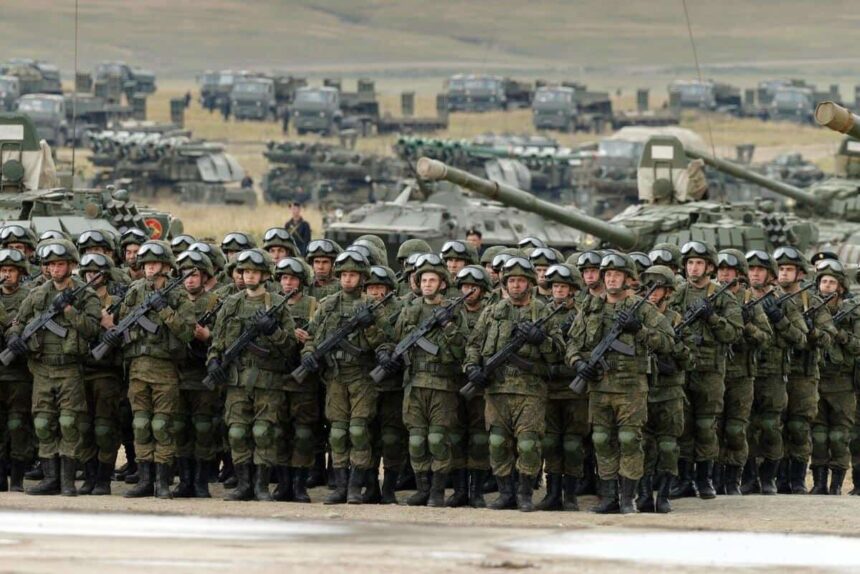The view of Russia as a significant and growing threat to the West has sparked considerable discussion, particularly following recent intelligence alerts indicating that Russia may launch a major conflict in Europe within the next five years. Although Russia continues to be a significant geopolitical player with nuclear capabilities, the view of its strength as an existential threat to the West appears to be exaggerated. The conflict in Ukraine has significantly undermined Russia’s financial, military, economic, and demographic stability, thereby diminishing its capacity for effective power projection in the long term. Post-war Russia appears to be evolving from an aggressive, expansionist force into a declining power that faces challenges in sustaining its domestic stability and regional influence.
In light of warnings from Danish intelligence indicating that “Russia could start a major war in Europe within 5 years,” it is essential to consider the broader context, which suggests a reduced capacity for Russia to engage in extensive military operations beyond Ukraine. Moreover, should the West, especially the United States, maintain its backing of Ukraine, it is plausible that Russia may encounter a complete breakdown. A potential conflict in the coming years may lead to Russia’s fragmentation, as various republics pursue independence, mirroring the dissolution of the Soviet Union in 1991.
Military Decline and Depletion of Resources
Prior to the conflict in Ukraine, Russia was regarded as the second most formidable military globally, equipped with a substantial stockpile of both conventional and nuclear capabilities. Nonetheless, the military performance in Ukraine has revealed significant vulnerabilities. The Russian Armed Forces have experienced significant casualties, with estimates indicating that over 300,000 soldiers have been killed or wounded. Furthermore, the destruction of thousands of tanks, armoured vehicles, and aircraft has led to a significant depletion of Russia’s military capabilities.
Furthermore, the sanctions imposed by Western nations have limited Russia’s ability to obtain high-tech components essential for the production of advanced weaponry. The dependence on obsolete Soviet-era equipment and the enlistment of convicts alongside inadequately trained conscripts underscore the decline in the capabilities of the Russian military. The extended conflict has revealed significant logistical shortcomings, ineffective command structures, and diminished morale within Russian forces. The identified factors significantly constrain Russia’s capacity to present a conventional military threat to NATO or to execute additional large-scale invasions beyond Ukraine.
Should Russia initiate another significant conflict in the coming years, it would likely encounter substantial military losses, exacerbating the vulnerabilities of its already precarious situation. A drawn-out military conflict may deplete Russia’s available resources and hasten its internal instability.
Economic and Financial Weaknesses
The economy of Russia has experienced considerable deterioration as a result of unprecedented sanctions imposed by Western nations. The decline of European energy markets, especially regarding oil and natural gas exports, has compelled Russia to offer its resources at lower prices to China and India, leading to a decrease in its revenue streams. Furthermore, the Russian financial sector faces significant isolation from Western markets, with access to essential technologies being notably limited.
The Russian economy is showing a growing dependence on China, which is constraining its strategic autonomy, despite efforts to bypass sanctions. The departure of Western businesses, the emigration of skilled professionals, and the escalating costs associated with military expenditures have exacerbated Russia’s financial challenges. The Kremlin’s heightened dependence on military production and state-controlled industries has resulted in an economic model that appears unsustainable and echoes the characteristics of the Soviet era. Over time, Russia is unlikely to possess the necessary resources to maintain a competitive arms race with NATO or to substantially broaden its geopolitical aspirations.
The support provided by Western nations to Ukraine, encompassing military aid, economic assistance, and sanctions imposed on Russia, has significantly strained Russia’s economy, pushing it toward a critical threshold. The continuation of economic deterioration may precipitate another conflict, which could trigger financial collapse and subsequently lead to significant domestic unrest and political instability. This may reflect the economic turmoil experienced in the later stages that played a role in the dissolution of the Soviet Union.
Demographic Crisis and Workforce Shortages
The decline in Russia’s demographics represents a significant challenge to its capacity to sustain its status as a major power. The nation is experiencing a sustained decrease in population attributed to factors such as low birth rates, high mortality rates, and emigration trends. The conflict in Ukraine has intensified this crisis, resulting in hundreds of thousands of young men being killed in combat, suffering severe injuries, or leaving the country to escape conscription.
Furthermore, the decline in Russia’s capacity to draw migrant workers from Central Asia is attributed to deteriorating economic conditions, exacerbating the existing labour shortages. The decline in the number of young individuals joining the workforce, coupled with a decreasing population, poses significant risks to Russia’s long-term economic and military viability. The demographic crisis indicates that Russia will face significant challenges in recruiting sufficient soldiers and skilled professionals to sustain its military endeavours, even if it makes efforts to rebuild its forces.
The ongoing engagement of Russia in extended conflicts may lead to a significant and potentially irreversible loss of young men, which would likely exacerbate the existing trend of population decline. A significant demographic crisis may play a role in fostering regional separatist movements, potentially resulting in the fragmentation of the Russian Federation.
Strategic Isolation and Loss of Influence
One additional factor that warrants consideration is the growing geopolitical isolation of Russia. Although it maintains certain alliances with countries like China, Iran, and North Korea, its position on the global stage has notably diminished. A number of former Soviet states, especially those in Central Asia and the Caucasus, are increasingly distancing themselves from Moscow, acknowledging its diminished influence. China, often viewed as a strategic partner to Russia, perceives Moscow more as a junior partner than an equal, which further constrains Russia’s influence on the global stage.
NATO has indeed reinforced its position in light of Russia’s aggression, as evidenced by the accession of Finland and Sweden to the alliance, which effectively increases the strategic encirclement of Russia. Rather than enhancing its influence, Russia has unintentionally driven neighbouring countries to pursue security under NATO, thereby compromising its strategic goals.
Increased military engagement by Russia in the near future may lead to a heightened state of isolation for the country. The heightened military and economic pressure from Western nations may result in domestic unrest and potentially undermine Moscow’s control over its distant territories. Should internal fractures expand, various regions—including Chechnya, Dagestan, and the Far East—may advocate for increased autonomy or potentially seek independence, mirroring the trajectory observed during the Soviet collapse in 1991.
The Five-Year Concern and Overstated Fears
In light of the observable decline in Russia’s strength, certain intelligence agencies, including Denmark’s, have issued warnings regarding the potential for Russia to initiate a significant conflict in Europe within the next five years. This assertion, while rooted in apprehensions about Russia’s military strengths and geopolitical objectives, should not be interpreted as a reflection of Russia’s capacity to execute a successful large-scale invasion of NATO member countries. The inherent weaknesses present in the Russian state, including its declining military strength, economic instability, and demographic challenges, indicate that the likelihood of such an event occurring is quite low.
This warning appears to be indicative of a wider narrative concerning Russian expansionism, rather than a thorough examination of its present capabilities. The possibility of Russia participating in localized conflicts or cyber warfare persists; however, the prospect of a large-scale, conventional war throughout Europe, similar to the invasion of Ukraine, appears improbable considering the present course of Russian decline.
Moreover, there is a significant risk of collapse for Russia should it overextend its military capabilities. Should another conflict result in significant losses, the potential for domestic instability to escalate becomes a pressing concern. The emergence of regional separatist movements, alongside a deteriorating economy and waning public support for the government, may compel the Russian Federation to face a crisis reminiscent of the disintegration experienced by the Soviet Union.
Final Assessment
The cautionary statement from Danish intelligence regarding the potential for Russia to initiate a significant conflict in Europe within the next five years warrants careful consideration, as it fails to account for the larger structural factors that may limit Russia’s ability to pursue such a course of action. Furthermore, should the West, especially the U.S., maintain its support for Ukraine, it is plausible that Russia could experience a total collapse. A subsequent war in a few years would likely expedite its decline, potentially resulting in fragmentation akin to the collapse of the Soviet Union.
The West ought to perceive Russia not as a formidable threat due to expansionism, but rather as a diminished state facing potential internal instability. While vigilance remains essential, it is equally important to recognize the limitations imposed on Russia by these multifaceted challenges, which collectively diminish its potential to engage in large-scale military conflicts in the foreseeable future.







